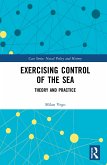This book describes and analyses two iconic figures in twentieth-century naval history: the German Admiral Alfred von Tirpitz and the Russian Admiral Sergei Gorshkov. It examines the men, what they thought and wrote about seapower, the fleets they created and the strategic consequences of what they did. More broadly, it draws on the respective histories of the post-1897 Imperial German Navy and the post-1956 Soviet Navy to examine the continental bid for large-scale seapower. The work argues that both individuals built navies that did not, and could not, fulfil the objectives for which they were created. Drawing on the legacies of both men, the book also develops some wider ideas about the creation of large navies by continental states, with cautionary lessons for today's emerging powers, India and China. Both admirals have received book-length biographies, but this is the first attempt at a comparative study and the first to draw broader strategic lessons from their respective attempts as continental navalists to challenge maritime states.¿ This book will be of much interest to students of naval history, strategic studies and International Relations.
Hinweis: Dieser Artikel kann nur an eine deutsche Lieferadresse ausgeliefert werden.
Hinweis: Dieser Artikel kann nur an eine deutsche Lieferadresse ausgeliefert werden.








